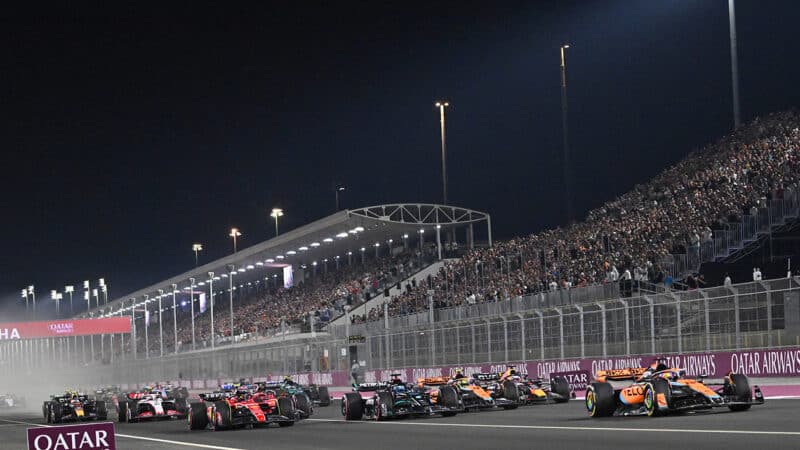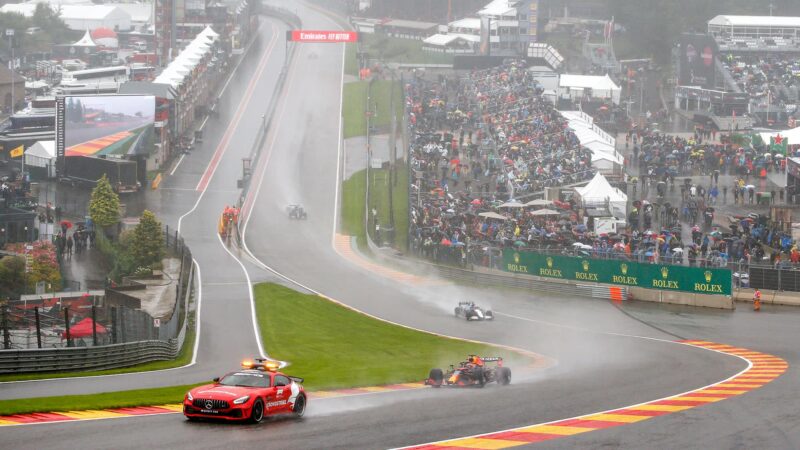F1 points system: how it works, and what has changed
How many points do you get for winning an F1 race? See details of grand prix and sprint points, as well as a look back at previous systems

Grand Prix Photo
Max Verstappen‘s record F1 points haul in 2023 was achieved thanks to his season-long domination, but also the current points system. With 25 points awarded for a race — and far more grands prix held than in the early days of the championship — he has been able to accrue points at a much faster rate than many of his predecessors.
But from 2025 onwards, there will be 24 less points on offer as the FIA has elected to drop the point awarded for fastest lap at each grand prix.
Since its introduction in 2019, the fastest lap point has been ironically regarded as ‘pointless’ by the majority of drivers and teams. It has made little difference to the standings in both F1 world championships and, for most of the time, has only been attainable for the top teams — who often make an extra stop later in the race when they are not in podium contention or have a healthy gap to their rivals behind.
It has also caused its fair share of controversy. At the 2024 Singapore GP, RB — Red Bull‘s sister outfit — curiously elected to pit Daniel Ricciardo late in the race. After emerging from the pitlane in last place, although now on fresh rubber, the Aussie was later able to snatch the fastest lap point away from race winner Lando Norris and limited the damage for Red Bull’s Max Verstappen in the drivers’ title race.
Speculation of foul play began to circulate, and eventually led to the point being discarded for the 2025 season.
Scroll down for full details of how F1 currently awards points to the first ten finishers in each race, plus the sprint race allocation, as well as every grand prix points system that came before.
Formula 1 Grand Prix points system
| Finishing Position | Points Awarded |
| 1st | 25 |
| 2nd | 18 |
| 3rd | 15 |
| 4th | 12 |
| 5th | 10 |
| 6th | 8 |
| 7th | 6 |
| 8th | 4 |
| 9th | 2 |
| 10th | 1 |
| 11th or below | 0 |
Sprint races
Saturday sprint races were introduced at three races in the 2021 F1 season and their results initially determined the grid for the next day’s grand prix.
Limited points were also available: the sprint winner scored three, the second-placed driver took two and the third earned a single point.
That was revised in 2022 so there’s now more at stake. Sprint winners now score eight points with second-place earning seven and so forth until it goes down to eighth where one point is available.
Formula 1 sprint race points system
| Finishing Position | Points Awarded |
| 1st | 8 |
| 2nd | 7 |
| 3rd | 6 |
| 4th | 5 |
| 5th | 4 |
| 6th | 3 |
| 7th | 2 |
| 8th | 1 |
| 9th or below | 0 |
F1 points awarded for shortened grands prix
The 2021 Belgian Grand Prix forced a change in points rules, when extremely wet conditions, saw the drivers complete just two laps both of which were under a safety car.
That fulfilled a condition within the regulations, that two laps had to be completed in order for points to be handed out, while if no more than 75% of the scheduled race distance was completed, then half points would be awarded.

The only running in 2021 Belgian GP took place behind the safety car
DPPI
So, under those circumstances, Max Verstappen earned 12.5 points after finishing first with second-placed George Russell scoring nine, despite not racing for a single lap.
After the heavy criticism that followed, a new points system for shortened races was brought in. At least two laps must now been completed under green flag conditions for points to be awarded.
In addition, should the leader have completed more than two laps but less than 25% of the scheduled race distance, the top five finishers will be awarded the following points:
F1 points awarded when under 25% race distance is completed
| Finishing Position | Points Awarded |
| 1st | 6 |
| 2nd | 4 |
| 3rd | 3 |
| 4th | 2 |
| 5th | 1 |
| 6th and below | 0 |
If the leader has completed more than 25% of the scheduled distance but less than 50%, reduced points will be awarded to the top nine.
F1 points awarded when 25%-50% race distance is completed
| Finishing Position | Points Awarded |
| 1st | 13 |
| 2nd | 10 |
| 3rd | 8 |
| 4th | 6 |
| 5th | 5 |
| 6th | 4 |
| 7th | 3 |
| 8th | 2 |
| 9th | 1 |
| 10th and below | 0 |
Finally, if the leader completes at least 50% of the planned distance but less than 75%, reduced points will be awarded to the top 10.
F1 points awarded when 50%-75% race distance is completed
| Finishing Position | Points Awarded |
| 1st | 19 |
| 2nd | 14 |
| 3rd | 12 |
| 4th | 9 |
| 5th | 8 |
| 6th | 6 |
| 7th | 5 |
| 8th | 3 |
| 9th | 2 |
| 10th | 1 |
| 11th and below | 0 |
Any race that completes at least 75% of the scheduled distance will see full points awarded to the top 10.
F1 points system through history
The current Formula 1 points system is considerably more generous than in the championship’s debut season in 1950.
Then, just eight points were available to the race winner with only the top five scoring, as seen in the table below:
F1 points system, 1950-1960
| Finishing Position | Points Awarded |
| 1st | 8 |
| 2nd | 6 |
| 3rd | 4 |
| 4th | 3 |
| 5th | 2 |
| 6th and below | 0 |
During that time, there was also a point awarded to the driver who set the fastest lap, and every driver was eligible, no matter their finishing position.
The fastest lap point was then dropped in 1959 before making a return 60 years later.
The points system was then changed in 1961. This time, the top six received points, with a nine awarded to the winner.
F1 points system, 1961-1990
| Finishing Position | Points Awarded |
| 1st | 9 |
| 2nd | 6 |
| 3rd | 4 |
| 4th | 3 |
| 5th | 2 |
| 6th | 1 |
| 7th and below | 0 |
This is the longest-serving points system in grand prix racing, and was used until 1990. One key aspect was that only a certain amount of results counted towards a driver’s championship total.
F1 dropped results system (1950-1990)
Unreliability and the common practice of missing races saw a dropped results system introduced for the very first world championship in 1950, where only the driver’s best finishes would count towards their championship score. This continued until 1990.
In 1950 although Luigi Fagioli scored 28 points during the seven-round season, only his four best results counted so he finished third in the standings on 24.
The number of results that contributed to a driver’s final score changed throughout the years as the seasons grew longer, and on at least two occasions, the title winner scored fewer points in total than the driver who finished runner-up.
In 1964, Graham Hill scored the most points but only his top 6 results counted towards the championship, so he was forced to drop his fifth from the Belgian Grand Prix which meant he lost out on the title to John Surtees, whose best six results were all podiums while the others were DNFs.
It then happened again in the 1988 season where McLaren duo Alain Prost and Ayrton Senna were in a fierce title battle winning 15 of the 16 races that year.
If the drivers didn’t have to drop results, Prost would have denied Senna his maiden title, finishing the year on 105 points compared to his rival’s 94.
However, only their 11 best classifications counted. Prost was forced to drop three second-place finishes compared to Senna whose only dropped non-podiums finishes.
Thus Senna became the 1988 Formula 1 world champion on 90 points, with Prost in second on 87 despite arguably being the more dominant driver that year.
For 1991 the system it was scrapped altogether following Senna’s second title win the season before.
F1 points system, 1991-2002
Along with the removal of the dropped points system, in 1991 F1 also decided to award more for a victory:
| Finishing Position | Points Awarded |
| 1st | 10 |
| 2nd | 6 |
| 3rd | 4 |
| 4th | 3 |
| 5th | 2 |
| 6th | 1 |
| 7th and below | 0 |
Formula 1 used this for the rest of the decade and beyond before deciding to change it for 2003 in response to the dominance of Michael Schumacher.
In an attempt to avoid a runaway championship winner early in the season, F1 narrowed the points difference between the podium positions, and increased the number of points-paying places. It had an immediate impact on the 2003 standings.
This time, Schumacher narrowly won his sixth championship by just two points as opposed to his gap of 67 the year prior.
F1 points system 2003-2009
| Finishing Position | Points Awarded |
| 1st | 10 |
| 2nd | 8 |
| 3rd | 6 |
| 4th | 5 |
| 5th | 4 |
| 6th | 3 |
| 7th | 2 |
| 8th | 1 |
| 9th and below | 0 |
This system was used for the rest of the decade before F1’s most radical points change for the 2010 season, which saw a huge 25 points being awarded for a race victory with a bigger gap between 1st and 2nd.
F1 believed this change would promote a ‘race-to-win’ attitude. Twelve years later and that change in 2010 has more or less remain untouched, save for the reintroduction of the fastest lap bonus point in 2019.
There was also an anomaly in 2014 when Formula 1 offered double points for the Abu Dhabi season finale in an effort to increase the chances of the championship going down to the wire. It was not popular and seen as too artificial.
In the end, it didn’t hold an impact on the championship winner as Lewis Hamilton beat Nico Rosberg, and would have done the same without double points.
It was subsequently scrapped for the 2015 season and has not returned.
